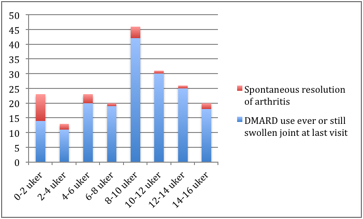Session Information
Title: Rheumatoid Arthritis - Clinical Aspects II: Identifying Rheumatoid Arthritis in At-Risk Populations
Session Type: Abstract Submissions (ACR)
Background/Purpose:
In 2010 the new ACR/EULAR classification criteria for rheumatoid arthritis (RA criteria) were published. The prospects for early diagnosis and treatment have increased over the past decades, partly driven by the theory of a window of opportunity. The theory even implies the possibility of preventing development of RA if aggressive treatment is started early. We wanted to study the 2-year outcome of patients with arthritis of less than 16 weeks duration who fulfilled the RA criteria at baseline, according to the duration of joint swelling at first visit.
Methods:
1084 patients (age 18-75 years) were included in the NOR-VEAC (Norwegian Very Early Arthritis Clinic) study from 2004 to 2010, i.e. before the RA criteria were implemented.
Patients with crystal arthritis, septic arthritis, osteoarthritis and arthritis due to trauma were excluded. 234 patients (21.6%) fulfilled the RA criteria at baseline. 202 of these had information about DMARD use and were included in the current study, and168 (83.2%) had 2-year follow-up data.
The relationship between spontaneous resolution of arthritis (defined as no swollen joints at last visit and never used DMARDs) and duration of joint swelling, as well as other factors, was examined. Duration was treated as a non-linear continuous variable as well as divided into categories. Mann-Whitney U, Fisher’s exact and Chi-Square tests were used for the statistical analyses.
Results:
Duration of joint swelling [median (25-75 percentiles)] was 64 (38-83) days, mean (SD) age 52 (14) years, 62% were females, 60% anti-CCP positive, and 69% anti-CCP and/or RF positive. 23/202 (11.4%) had spontaneous resolution of arthritis.
There was a statistically significant relationship between duration of disease and tendency of spontaneous resolution of arthritis (Mann-Whitney U p=0.01). In cases with very short (0-2 weeks) duration, the arthritis resolved without DMARDs in 9/23 patients (39.1%). The corresponding proportion for 2-6 weeks duration was 5/36 (13.9%), and for >6 weeks duration 9/143 (6.3%). The patients with resolving arthritis less often had positive anti-CCP (p<0.001),were more seldom current daily smokers (p=0.01) and had less RA criteria points (p=0.02). There were no significant differences between the groups with regard to sex (p=0.50), age (p=0.28), 68-swollen (p=0.34) and 28-tender (p=0.97) joint counts, SR (p=0.42), CRP (p=0.50), BMI (p=0.51), fatigue (p=0.93), joint pain (p=0.13), patient global (p=0.28), assessor global (p=0.37), HAQ (p=0.27) or distribution of mono-, oligo- and polyarthritis (p=0.62).
Conclusion:
When the duration of joint swelling was very short, the arthritis resolved without initiation of DMARD treatment in a considerable proportion of patients who fulfilled the RA criteria at baseline. Patients with arthritis of more than 6 weeks duration experienced spontaneous resolution less frequently.
Disclosure:
E. S. Norli,
None;
E. Lie,
Pfizer Inc,
5,
Roche Pharmaceuticals,
5,
Abbott Immunology Pharmaceuticals,
5,
Bristol-Myers Squibb,
5;
G. H. Brinkmann,
None;
O. Bjørneboe,
None;
H. Nygaard,
None;
A. J. Haugen,
None;
P. Stolt,
None;
C. Thunem,
None;
T. K. Kvien,
None;
M. Mjaavatten,
None.
« Back to 2013 ACR/ARHP Annual Meeting
ACR Meeting Abstracts - https://acrabstracts.org/abstract/spontaneous-remission-in-patients-fulfilling-the-2010-classification-criteria-for-rheumatoid-arthritis-the-impact-of-duration-of-joint-swelling/

